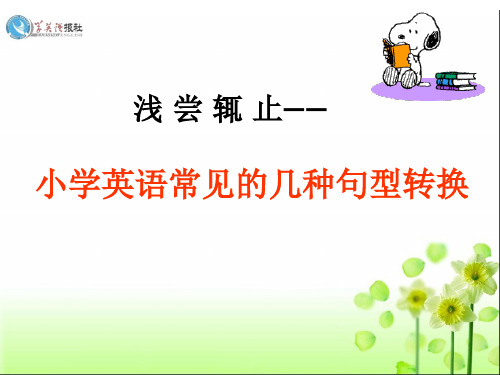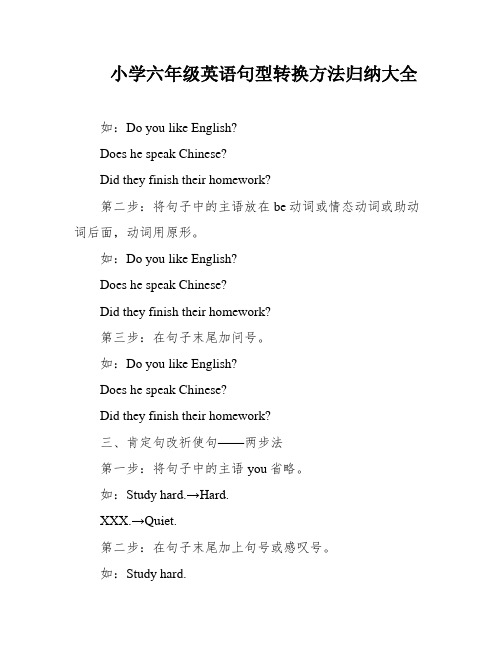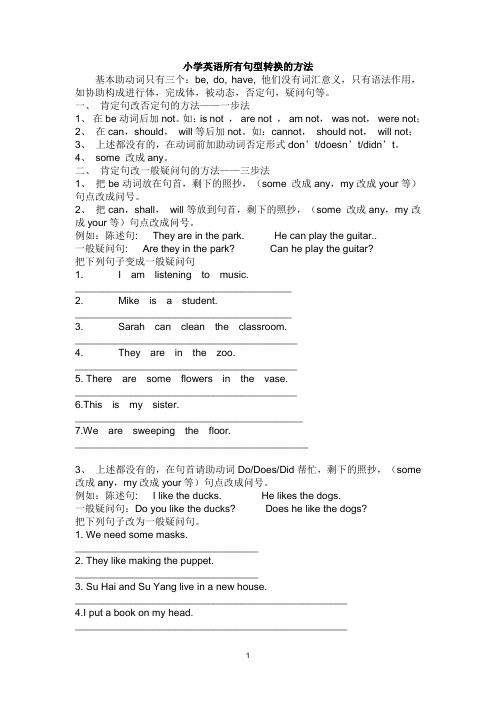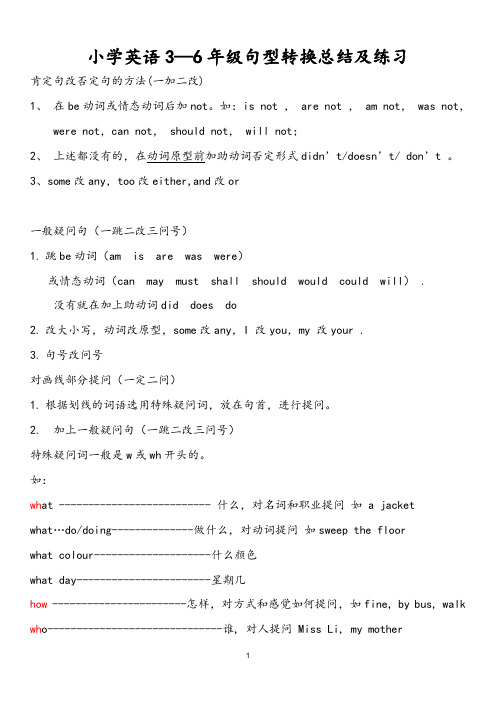小学英语三至六年级句型转换全
小学英语 句型转换(一变二找三换四移)

1.I often get up at 7 o`clock. ---(P2) I don ’ t often get up at 7 o`clock. 2. We finish class at 1 o`clock. ----(P4) We don ’ t finish class at 1 o`clock? 3.Friday is good at sports.----(P9) 4. I can sleep all day.---(P12) I can not sleep all day. can ’ t 5. The colours are very pretty. ---(P17) The colours are not very pretty.
10. There will be a maths test next Monday. Will there be a maths test next Monday? (P31)
题型(二) 改为否定句
否定句:表示否定的意思
如: 我不是一个医生。 I am not a doctor. • 他不去上学。 • He does not go to school
加点难度试试?
3. Daniel enjoys playing computer games .
(改为一般疑问句并分别做肯定、否定回答)
Does Daniel enjoy playing computer games? Yes, he does. No, he doesn`t.
Now, you try!
浅 尝 辄 止——
小学英语常见的几种句型转换
题型(一) 变一般疑问句
be动词
be动词有三种形式,他们分别
是:
is am are
(完整版)小学英语句型转换专项练习

(完整版)小学英语句型转换专项练习句型转换方法归纳一、改为否定句1、先找be动词或情态动词.如果有这些词,直接在这些词的后面加not, some 改成any,其余照抄;2、如果句子中没有be动词或者是情态动词,要在动词前面加don’t 、doesn’t或者是didn’t,some 改成any,其余部分照抄。
(1)首先判断句子时态,如果句子是过去时,则要在动词前面加didn’t,这个动词用原形;(2)如果句子不是过去时,则判断主语是否为第三人称单数,如是,要在动词前面前加doesn’t,这个动词改为原形,其他情况均要在句子动词前面加don’t。
二、改为一般疑问句(some 改成any,I改成you,my改成your,句号改成问号,其余照抄)1、先找be动词 am, is, are, was, were或情态动词can, should 等等 .如果有这些词,直接把这些词放在句子最前面,;2、如果句子中没有be动词或者是情态动词,要在句子最前面加助动词 do 、does或者是did,后面动词用原形。
(1)首先判断句子时态,如果句子是过去时,则要在句子最前面加Did;(2)如果句子不是过去时,则判断主语是否为第三人称单数,如是,要在句子最前面加Does, 其他情况均要在句子最前面加Do三、对划线部分提问第一步:先把句子改成一般疑问句第二步:把提问部分省略,在句子最前面加疑问词。
(如果提问部分是动词词组,要把它改成do;如果提问部分是动名词词组,要把它改成doing)(注:如划线部分为主语,则用who代替,其余照抄)一,对下列句子中划线部分提问1,The deepest part(最深的部分)of the water is near Japan.______________________________________________________________ 2,My father will take me to Beijing.______________________________________________________________ 3,My trip to Xi’an is great.______________________________________________________________ 4,Harry Potter Ⅳ will be on this afternoon.______________________________________________________________ 5,I’m looking for a dress.______________________________________________________________ 7,I saw many animals in Beijing Zoo.______________________________________________________________ 8,I often help my grandfather on the farm.______________________________________________________________ 9,I am from Australia.______________________________________________________________ 10,We will go to the nearest supermarket.______________________________________________________________ 11,My new pencil-box is about ten yuan.______________________________________________________________ 12,The name of the book is Sleeping Beauty.______________________________________________________________ 13,He came to visit China two days ago.______________________________________________________________ 14,There are twelve students over there.______________________________________________________________ 16,These sneakers are 280 yuan.______________________________________________________________17,I get up at 6 o’clock every morning.______________________________________________________________ 20,Tom saw many places of interest(名胜古迹)in that old city.______________________________________________________________ 21,I came here by train.______________________________________________________________ 22,We are going to buy tomorrow’s air tick ets.______________________________________________________________ 23,He’s making a model ship.______________________________________________________________ 24,My father works in Africa.______________________________________________________________ 25,Mike wants to be a singer(歌手) in the future.______________________________________________________二,把下列句子变为一般疑问句:1. I am good at swimming.______________________________________________________2. Mike is a student in Grade Six.______________________________________________________3. Tom likes listening to the music______________________________________________________4. Sarah can clean the classroom.______________________________________________________6.He came to visit China two days ago(两天前).______________________________________________________7. I can speak English well.______________________________________________________8. Tony had a picnic for a long time.______________________________________________________9. They like making the cakes.______________________________________________________10. Jim and Ben often help their grandfather on the farm after school.______________________________________________________12. He wants to be an actor(演员)in the future(将来).______________________________________________________ 13.We play basketball on Sundays.______________________________________________________ 14.We should take care of(照看)the young trees.______________________________________________________ 15. The girls are singing in the classroom.______________________________________________________ 16. She has something to eat.______________________________________________________ 17. Alice came to our home last week.______________________________________________________ 18. The little boy is standing on the man's shoulders.______________________________________________________ 19.There is some fruit juice in the glass.______________________________________________________ 20. We will visit America next week(下一周).______________________________________________________ 三,将下列句子变为否定句:1.He takes some pictures every day.______________________________________________________ 4.Show me your library card, please.______________________________________________________ 8.There are a lot of lovely animals there.______________________________________________________ 9.Mymother will take me to Beijing next Sunday.______________________________________________________ 10.You can find many tall trees in the picture .______________________________________________________。
小学六年级英语句型转换方法归纳大全

小学六年级英语句型转换方法归纳大全如:Do you like English?Does he speak Chinese?Did they finish their homework?第二步:将句子中的主语放在be动词或情态动词或助动词后面,动词用原形。
如:Do you like English?Does he speak Chinese?Did they finish their homework?第三步:在句子末尾加问号。
如:Do you like English?Does he speak Chinese?Did they finish their homework?三、肯定句改祈使句——两步法第一步:将句子中的主语you省略。
如:Study hard.→Hard.XXX.→Quiet.第二步:在句子末尾加上句号或感叹号。
如:Study hard.Be quiet!Original article:XXX and I went to the park yesterday。
We played catch and had a ic。
The weather was nice and sunny。
We saw some kids XXX。
We had a great time.Corrected and rewritten:XXX。
my friend and I went to the park。
We played catch and had a ic on the grass。
The weather was beautiful and sunny。
While we were there。
we saw some children flying kites and some people walking their dogs。
It was a wonderful day and we had a lot of fun.When forming a n in English。
小学英语基本句子结构与句型转换

小学英语基本句子结构与句型转换1.基本句子结构:-主语+谓语-主语+谓语+宾语-主语+谓语+宾语+宾语补足语-主语+谓语+表语-主语+谓语+宾语+表语2.句型转换:- 肯定句变否定句:将谓语动词前加上 "do not" 或 "does not"。
- 否定句变肯定句:删除谓语动词前的 "do not" 或 "does not"。
-一般疑问句:将谓语动词调整到句首,并在句末加上问号。
- 特殊疑问句:疑问词(如 what, where, who, when, why, how)放在句首,然后按照一般疑问句的结构进行调整。
- 肯定句变否定问句:在肯定句的句首加上 "do" 或 "does",并在句末加上问号。
- 否定句变肯定问句:删除谓语动词前的 "do not" 或 "does not",并在句末加上问号。
-祈使句:将谓语动词原型放在句首,并在句末加上句号或感叹号。
- 感叹句:在肯定句的句首加上 "how",并在句末加上感叹号。
例子:1.基本句子结构:- 我喜欢游泳。
I like swimming.- 她正在读书。
She is reading.2.句型转换:- 肯定句变否定句:I don't like swimming. She isn't reading.- 否定句变肯定句:I like swimming. She is reading.- 一般疑问句:Do you like swimming? Is she reading?- 特殊疑问句:What do you like? Where is she reading?- 肯定句变否定问句:Don't you like swimming? Isn't she reading?- 否定句变肯定问句:Do you like swimming? Is she reading?- 祈使句:Like swimming. Read.- 感叹句:How beautiful it is!。
(完整版)小学英语句型转换

小学英语所有句型转换的方法基本助动词只有三个:be, do, have, 他们没有词汇意义,只有语法作用,如协助构成进行体,完成体,被动态,否定句,疑问句等。
一、肯定句改否定句的方法——一步法1、在be动词后加not。
如:is not ,are not ,am not,was not,were not;2、在can,should,will等后加not。
如:cannot,should not,will not;3、上述都没有的,在动词前加助动词否定形式don’t/doesn’t/didn’t。
4、some 改成any。
二、肯定句改一般疑问句的方法——三步法1、把be动词放在句首,剩下的照抄,(some 改成any,my改成your等)句点改成问号。
2、把can,shall,will等放到句首,剩下的照抄,(some 改成any,my改成your等)句点改成问号。
例如:陈述句: They are in the park. He can play the guitar..一般疑问句: Are they in the park? Can he play the guitar?把下列句子变成一般疑问句1. I am listening to music._______________________________________2. Mike is a student._______________________________________3. Sarah can clean the classroom.________________________________________4. They are in the zoo.________________________________________5. There are some flowers in the vase.________________________________________6.This is my sister._________________________________________7.We are sweeping the floor.__________________________________________3、上述都没有的,在句首请助动词Do/Does/Did帮忙,剩下的照抄,(some 改成any,my改成your等)句点改成问号。
小学译林英语3—6年级句型转换总结及练习

小学英语3—6年级句型转换总结及练习肯定句改否定句的方法(一加二改)1、在be动词或情态动词后加not。
如:is not , are not , am not, was not,were not,can not, should not, will not;2、上述都没有的,在动词原型前加助动词否定形式didn’t/doesn’t/ don’t 。
3、some改any,too改either,and改or一般疑问句(一跳二改三问号)1.跳be动词(am is are was were)或情态动词(can may must shall should would could will) .没有就在加上助动词did does do2.改大小写,动词改原型,some改any,I 改you,my 改your .3.句号改问号对画线部分提问(一定二问)1.根据划线的词语选用特殊疑问词,放在句首,进行提问。
2. 加上一般疑问句(一跳二改三问号)特殊疑问词一般是w或wh开头的。
如:wh at -------------------------- 什么,对名词和职业提问如 a jacketwhat…do/doing--------------做什么,对动词提问如sweep the floorwhat colour--------------------什么颜色what day-----------------------星期几how -----------------------怎样,对方式和感觉如何提问,如fine, by bus, walk wh o------------------------------谁, 对人提问 Miss Li, my motherwh ose+名词--------谁的,对名词所有格和物主代词提问,如Lily’s, mine, hiswhere----------------------------哪里,对地点提问, 如 at schoolwhen-----------------------------什么时间,对时间提问,如 at half past five how many+名词复数---------多少,对数量提问,如 twenty, fivehow much----------------------多少,对不可数名词和价格提问how old------------------------多少岁which+名词-------------------哪一个,对形容词提问,如 I like the big ball.Why-----------------------------为什么一、将下列句子改为否定句1、I have a soccer, too.2、She has some apples.3、Please don’t open the window.4、Bill doesn’t like bananas.5、I ate ice cream for lunch.二、对画线部分提问。
小学英语句型转换题及答案
小学英语句型转换题及答案1. 他吃了一个苹果。
(改为一般疑问句)Did he eat an apple?2. 我的朋友们都喜欢足球。
(改为否定句)None of my friends like soccer.3. 这是谁的书包?(改为复数形式)Whose backpacks are these?4. 我可以用你的铅笔吗?(改为同义句)May I borrow your pencil?5. 我们正在听音乐。
(改为一般疑问句)Are we listening to music?6. 那只猫有一条长长的尾巴。
(改为感叹句)What a long tail that cat has!7. 他每天都骑自行车上学。
(改为否定句)He doesn't ride a bike to school every day.8. 她的生日是在三月二十五号。
(改为一般疑问句)Is her birthday on March 25th?9. 请把门关上。
(改为同义句)Could you close the door, please?10. 我们在公园里踢足球。
(改为现在进行时)We are playing soccer in the park.11. 他住在一座大房子里。
(改为一般疑问句并作否定回答)Does he live in a big house? No, he doesn't.12. 这个房间里有一张桌子和两把椅子。
(改为复数形式)There are two tables and four chairs in this room.13. 你能帮我拿下这个箱子吗?(改为同义句)Can you help me take off this box?14. 她正在做作业。
(改为否定句)She is not doing homework.15. 这是我的自行车。
(改为一般疑问句)Is this my bicycle?16. 我的弟弟每天早上六点起床。
六年级英语句型转换及答案
六年级英语句型转换及答案在六年级的英语学习中,学生们需要掌握并运用多种英语句型进行表达。
句型转换是提高语言运用能力的重要一环,通过对原句进行改写,学生们可以更加灵活地运用所学的语法知识来表达自己的意思。
下面将详细介绍一些常见的六年级英语句型转换,并给出相应的答案。
1. 肯定句转否定句:将肯定句改为否定句时,通常需要在动词前加上否定词not。
例如:She is my friend. → She is not my friend.2. 否定句转肯定句:将否定句改为肯定句时,通常需要去掉否定词not。
例如:He doesn't like soccer. → He likes soccer.3. 一般疑问句转陈述句:将一般疑问句改为陈述句时,通常需要用肯定或否定回答中的一个来作为答句。
例如:Do you like ice cream? → Yes, I do. / No, I don't.4. 陈述句转特殊疑问句:将陈述句改为特殊疑问句时,通常需要将疑问词放在句首。
例如:You are from China. → Where are you from?5. 一般现在时转一般过去时:将一般现在时改为一般过去时时,通常需要将动词的过去式形式。
例如:She sings well. → She sang well.6. 一般过去时转一般将来时:将一般过去时改为一般将来时时,通常需要在动词前加助动词will。
例如:They visited the museum last week. → They will visit the museum next week.7. 现在进行时转一般现在时:将现在进行时改为一般现在时时,通常需要去掉be动词,并根据主语的单复数形式来决定动词的形式。
例如:I am reading a book. → I read a book.8. 一般现在时转现在进行时:将一般现在时改为现在进行时时,通常需要在动词前加上be动词,并将动词的原形变为-ing形式。
小学三年级英语句型转换大全及答案
小学三年级英语句型转换大全及答案小学三年级英语句型转换大全及答案 1句型转换。
1.They are flying kites overthere.(改为一般疑问句) ________ ______ they ______ over there? 2.I’m doing my homework.(改为一般疑问句) ______ _____ ______ your homework? 3.Nancy wants to go to the movies.(改为否定句) Nancy ______ ______ to go to the movies. 4.Ann plays the pianoin the room.(用now 改写) Ann ______ _______ the piano in the room now.5.Hedoesn’tlikefishormeat.(改为肯定句)He___________fish___________meat. 6. There is agirl in the room. (改为复数形式) There ___ five ___ in the room. 7. There are some hills in the picture. (改为一般疑问句) ______ ______ ______ hills in the picture? 8. Do it like this. (改为否定句) ______ ______ it like this. 9. Can you throw a frisby? (做否定回答) ______, I ______. 10. That's my friend, Bill. (改为一般疑问句) ______ ______ that?小学三年级英语句型转换大全及答案 21.I know the answer.(一般疑问句) ______ ______ know the answer?2.We can see some birds.(一般疑问句) ______ ______ see ______ birds?3.There is a puter in my house.(一般疑问句)______ ______ a puter in house?4.There are some flowers on theteachers'desk.(一般疑问句) ______ ______ ______ flowers on the teachers'desk? 5.There are some apples on the tree.(否定式)There ______ ______ ______ apples on the tree. 6.I think he is very old.(否定句) I ______ think he ______ very old. 7.Please colour it green.(否定句) ______ ______ colour it green.8.We can speak good English.(变否定句) We ____________ speak good English. 9.Thank you for helping me.(同义句) Thank you for ______ ______ . 10.There aren't any pears in thebox.(同义句)There are ______ pears in the box. 11.Whose are these clothes?(同义句) ______ ______ are these? 12.Let me look at your book.(同义句)Let me ______ ______ ______ ______ your book. 13.These are cars.(用buses改写成选择疑问句)Are these cars______ ______ ? 14.The book is in my schoolbag.(变否定疑问句)______ the book in your school-bag? 15.Two boys are in our house.(改为there be句型)______ ______ two boys in our house.小学三年级英语句型转换大全及答案 3一、把下列句子改成一般疑问句 1. There is a pencil in the desk. _______________________________ 2. Eddie has got some books.________________________________ 3. They are my friends. ____________________________________ 4. Ben and Tom can ride bicycles._____________________________ 5. I like ladybirds. _____________________________________ 6. I have gota new balloon. _________________________________二、把下列句子改成否定句 1. The skateboards are black. ________________________________ 2. Closethe door. _________________________________ 3. Is there any flour in the bag?_______________________________ 4. My father and I like fish. _________________________________ 5. Its branches are long.(意思不变,改否定句.)____________________ 6. Do you like moths?_________________________________ 三、其他 1. Are they circles? Yes, they are.(单数)_______________________ 2. Are there any sheep?(肯定句)______________________________ 3. There are some aviaries in the park.(单数)____________________ 4. Don’t pick the flowers.(意思不变,换种说法)____________________ 5. Don’t throw stones.(肯定句)________________________________ 6. I have got a camera.(用Kitty代替I)__________________________ 7. Do tigers like meat?(肯定句)______________________________。
小学三年级英语句式转换20道
小学三年级英语句式转换20道1. I am a student. (改为一般疑问句)答案:Are you a student?解析:陈述句中有am,改为一般疑问句时要把I 变为you,am 变为are。
2. She is happy. (改为一般疑问句)答案:Is she happy?解析:陈述句中有is,直接把is 提到句首即可。
3. They like apples. (改为一般疑问句)答案:Do they like apples?解析:陈述句中动词是like,且主语是they,改为一般疑问句要借助助动词do,放在句首。
4. We have a big house. (改为一般疑问句)答案:Do we have a big house?解析:同第3 题,借助助动词do 进行转换。
5. He can swim. (改为一般疑问句)答案:Can he swim?解析:陈述句中有can,直接把can 提到句首。
6. 陈述句:I am a student. 特殊疑问句:What are you? 解析:陈述句表达“我是一名学生”,转换为特殊疑问句,对“a student”进行提问,所以用“What are you?”。
7. 陈述句:She likes apples. 特殊疑问句:What does she like? 解析:原句说“她喜欢苹果”,对“apples”提问,要用“What does she like?”,注意助动词用does。
8. 陈述句:They are in the classroom. 特殊疑问句:Where are they? 解析:原句表示“他们在教室里”,对“in the classroom”提问,问地点用“Where are they?”。
9. 陈述句:He has a pen. 特殊疑问句:What does he have? 解析:“他有一支笔”,对“a pen”提问,借助助动词does ,所以是“What does he have?”。
- 1、下载文档前请自行甄别文档内容的完整性,平台不提供额外的编辑、内容补充、找答案等附加服务。
- 2、"仅部分预览"的文档,不可在线预览部分如存在完整性等问题,可反馈申请退款(可完整预览的文档不适用该条件!)。
- 3、如文档侵犯您的权益,请联系客服反馈,我们会尽快为您处理(人工客服工作时间:9:00-18:30)。
小学英语句型转换三上到四下1.My name is John.(就划线部分提问)____________________________________?2.I’m fine.(就划线部分提问)____________________________________?3.I’m 6 years old.(就划线部分提问)____________________________________?4.My bag is blue.(就划线部分提问)____________________________________?5.His name is John.(就划线部分提问)____________________________________?6.He’s Zhang Peng.(就划线部分提问)____________________________________?7.I’d like some soup.(就划线部分提问)__________________________________?8.I’d like some soup.(变为一般疑问句)__________________________________?9.My aunt is a nurse.(就划线部分提问)__________________________________?10.The library is on the first floor.(就划线部分提问)________________________?11These are Mike’s pants.(就划线部分提问)______________________________?12These are tomatoes.(就划线部分提问)_________________________________?13.This skirt is 100 yuan.(就划线部分提问)_______________________________?小学英语句型转换五上1.I have English on Mondays .(变为一般疑问句)_________________________________________?2.I have English on Mondays .(就划线部分提问)_________________________________________?3.I have English on Mondays .(变为否定句)_________________________________________.4.He has English on Mondays .(变为否定句)_________________________________________.5.I can sing English songs.(就划线部分提问)_________________________________________?6.I can sing English songs.(变为一般疑问句,并写出肯定答语和否定答语)__________________________________________________________________?7.There is a big bed in my room.(变为一般疑问句,并写出肯定答语和否定答语)__________________________________________________________________?8.There are some tall buildings in the city.(变为一般疑问句,写出肯定答语和否定答语)__________________________________________________________________?小学英语句型转换五下1.I often play football with my father .(变为一般疑问句)____________________?2.I often play football with my father .(就划线部分提______________________?3.I like summer best .(就划线部分提问)________season_______ _______ ______ ______?4.My birthday is in October.(就划线部分提问)___________________________?5.This shirt is Zhang Peng’s.(就划线部分提问)_____________________________?6.They are playing football.(就划线部分提问)______________________?7.They are playing football.(变为一般疑问句)___________________________?8.He is watchinging TV.(变为复数)___________________________?9.This is a hen.(变为复数)_______________________________.10.Those are my books.(变为单数)_____________________________.11.Is there a chair in the room?(变为复数)___________________________.小学英语句型转换六上1.The museum is near the door.(就划线部分提问)_______ ________the museum?2.The museum is near the door.(变为一般疑问句)______ ________ ________ near the door?3.The museum is near the door.(变为否定句)______ ________ ________ near the door.4.I come to school on foot.(就划线部分提问)______ ________ ________ come to school?5.I come to school on foot.(变为一般疑问句)______ ______ ______ ______ ______ on foot?6.I come to school on foot.(变为否定句)______ ______ ______ ______ ______ on foot.7.Stop and wait.(变为否定句)______ ______ ______ ______.Open the door.(变为否定句)______ ______ ______ ______.8.I’m going to see a film.(就划线部分提问)________________________?9.I’m going to see a film.(变为一般疑问句)________________________?10.I’m going to see a film.(变为否定句)I _____ ______ going to see a film.11.She is going to see a film.(就划线部分提问)_____ ______ ______ ________ _______ ________?12. She is going to see a film.(变为一般疑问句)_____ ______ ______ ________ _______ ________ ________?13.She is going to see a film.(变为否定句)She_____ going to see a film.14.We are going to the cinema.(就划线部分提问)_______ ______ ______ ________ ?15.We are going to the cinema.(变为一般疑问句)_____ ______ ______ ________ _______ ________?16.We are going to the cinema.(变为否定句)_____ ______ going to the cinema.17.We are going to the cinema tomorrow.(就划线部分提问)______ ______ ______ going to the cinema.18.Peter likes reading books.(就划线部分提问)比较特别非正常变化_______ ______ ______ ________ ?19.Peter likes reading books.(变为一般疑问句)_______ ______ ______ ________ ________ ?20.Peter likes reading books.(变为否定句)_______ ______ ______ ________ ________ .21.He lives in Sydney.(变为一般疑问句)_______ ______ ______ ________ ________ ?22.He lives in Sydney.(变为否定句)_______ ______ ______ ________ ________ ?23.Does he live in Beijing?(肯定答语)_______, ______ ______.23.Does he live in Beijing?(否定答语)_______, ______ ______.24.He likes going hiking.(变为一般疑问句)_______ ______ ______ ________ ________ ?25.He likes going hiking.(变为否定句)_______ ______ ______ ________ ________ ?26.Does he like going hiking?(肯定答语)_______, ______ ______.Does he like going hiking?(否定答语)_______, ______ ______.27.He is a businessman.(就划线部分提问)比较特别非正常变化______ ______ ________ ________ ?28.He is a businessman.(变为一般疑问句)______ ______ ________ ________ ?29.He is a businessman.(变为否定句)______ ______ ________ ________ .30.Is he a postman?(肯定答语)_______, ______ ______.31.Is he a postman?(定答语)_______, ______ ______.32.He works at school.(就划线部分提问)______ ______ ________ ________ ?33.He works at school.(变为一般疑问句)________________________?34.He works at school.(变为否定句)________________________?35.He goes to work by bus.(就划线部分提问)________________________??36.He goes to work by bus.(变为一般疑问句)________________________??37.You should see a doctor.(就划线部分提问)________________________??38.I am going to go hiking.(改为复数形式)______ ______ ________ ________ ________ ________ .39.He is going to do kung fu.(改为复数形式)______ ______ ________ ________ ________ ____ ____ .40.He likes singing.(改为复数形式)______ ________ ________ .小学英语句型转换六下1.I’m 1.68cm.(就划线部分提问)______ ________ ________ ?2.He’s 1.68cm.(就划线部分提问)______ ________ ________ ?3.My shoes are size 38.(就划线部分提问)______ ________ ________ ________?4.His shoes are size 7.(就划线部分提问)______ ________ ________ _______?5.My weekend was great.(就划线部分提问)______ _______ ________ _______?6.I cleaned my room and watched TV last weekend.(就划线部分提问)______ ________ ________ _______ ________ __________?7.I cleaned my room and watched TV last weekend.(变为一般疑问句)_______________________________________________________?8.I saw a film last night.(变为一般疑问句,并作肯定答语)_________________________________________________________________9.Did you take pictures in the park yesterday?(否定答语)_________________________________________________________________ 10.I went to Beijing last holiday.(就划线部分提问)______ ________ ________ _______ ________ ________?11.He went to Beijing last holiday.(就划线部分提问)______ ________ ________ _______ ________ ________?12.They went to Beijing by plane.(就划线部分提问)______ ________ ________ _______ ________ ________?13.He was short before.(改为否定句)________ _______ ________ ________.14.He played football yesterday.(用now改写)____________________________.15.He played football yesterday.(用tomorrow改写)_________________________.16.He played football yesterday.(用every day改写)_________________________.17.He often read books.(用now改写)_________________________.18.He often read books.(用tomorrow改写)____________________________.19.He often goes camping.(用yesterday改写)______________________________.20.I like maths.(用He改写)_______________________________.21.She likes doing kung fu.(用they改写)_________________________.22.He went to Beijing last holiday.(改为否定句)__________________________.23.There were some computers in my time.(改为否定句)_________________________________________________________________. 24.We drank tea in the afternoon and watched TV.(改为否定句)_________________________________________________________________.25.I saw a fim yesterday.(改为否定句)__________________________.26.He likes playing fooball.(改为否定句)__________________________.27.I cleaned my room and washed my clothes yesterday.(改为否定句)________________________________________________________.28.I cleaned my room and washed my clothes yesterday.(改为一般疑问句并做否定答语)________________________________________________________.。
